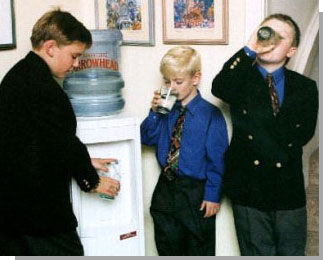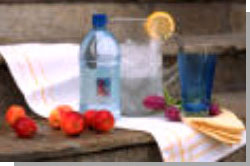|  Water, which has been sloshing around the Earth for billions
of years, is suddenly fashionable. No longer content to
quench
their thirst from the nearest tap, many Americans have taken
to toting their water with them, buying a record 3.2 billion
gallons of the bottled variety in 1998, about three times
as much as a decade ago. While there's no evidence that
bottled water is any better for people than the free-from-the-fountain
kind, the liquid's newfound popularity represents a healthy
trend.
Water, which has been sloshing around the Earth for billions
of years, is suddenly fashionable. No longer content to
quench
their thirst from the nearest tap, many Americans have taken
to toting their water with them, buying a record 3.2 billion
gallons of the bottled variety in 1998, about three times
as much as a decade ago. While there's no evidence that
bottled water is any better for people than the free-from-the-fountain
kind, the liquid's newfound popularity represents a healthy
trend.
Indeed, water is as vital to a good diet as low-fat foods,
fruits, vegetables, and whole grains. Some 55 to 65 percent
of a man's body and 50 to 60 percent of a woman's consists
of water, which is necessary for the proper functioning
of every organ, including the heart and brain. Without it,
you can't digest food, regulate body temperature, or build
new tissue.
How Much You Need
Most of us have heard from childhood that we need eight
glasses of water each day. But this is an arbitrary figure,
an average derived from studies that measure body composition
and water loss. You may require somewhat more or less, depending
on climate and the activities you pursue.
Any liquid that has water in it helps meet your daily
goal. In addition to the water, milk, fruit juice, coffee,
and tea you drink, your body extracts
water from the food you eat. In fact, many fruits and vegetables
are more than 90 percent water. Your body also produces
water as a byproduct of metabolism. So don't be concerned
if you fail to drink eight glasses of water a day. A simple
way to see if you're taking in sufficient fluids is to check
the color of your urine. If it's pale, you're getting enough
fluids; if it's dark yellow, however, you're not.
Many people have also been led to believe that drinking
coffee or tea will interfere with their ability to get as
much water as they need. While it's true that the caffeine
in coffee and tea is a diuretic, which tends to increase
the output of urine, these beverages do contribute to your
personal water supply. If you drink a cup of either one,
you'll urinate away half of what you take in within a couple
of hours; that may seem like a lot, but if you drink a glass
of plain water, you'll urinate away 35 percent. The point
is, you lose a significant amount of all the fluid you drink--which
is why you have to keep replenishing it daily.
Unfortunately, thirst isn't a good indicator of when
to drink water, especially when you're exercising. During
vigorous physical activity, you may lose a significant amount
of your fluid reserves before you're aware that you're thirsty.
Only after you have dropped 2 percent of your body weight
in fluid is your thirst mechanism triggered.
(If you ignore that thirst and drop 4 percent, your muscles
can lose their strength and endurance.) "Plan to drink
a lot of water before you start to exercise," recommends
Dorothy Diehl, Ph.D., an exercise physiologist at Plymouth
State College, in Plymouth, New Hampshire. "Then take
regular water breaks during a workout, whether you're thirsty
or not."
Bottled Versus Plain
Do you need your water
shipped in from France, or can you just turn on your kitchen
tap and fill a glass? It makes little difference to your
body. Bottled waters can come from wells, springs, and even
public water supplies. Although the labels sometimes picture
cool mountain glens, the water in the bottle may have come
from a tap in a neighboring town. "Don't assume that
drinking tap water will make you ill or that bottled water
will help you remain healthy," says Diehl.
Since the Environmental Protection Agency strengthened
the Safe Drinking Water Act in 1996, people who use municipal
water can drink it with assurance.
Water companies adhere
to mandatory standards, and the water is tested regularly.
If your water is provided by a municipal water company,
your supplier must tell you within 24 hours if the water
has become contaminated by something that can cause you
to become ill and whether it must be boiled.
In addition, states compile information from individual
water systems so that you can evaluate the overall quality
of your local drinking water. Water companies are now required
to distribute annual reports with information about where
your drinking water comes from, the results of monitoring,
and updates on health concerns associated with violations
that occurred during the year. So here's to your health:
Drink up!
↑TOP (761
words)
|